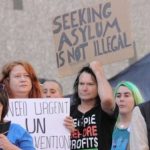Asylum Seekers Need Help: An Interview With RACS Solicitor Ben Lumsdaine

Australian immigration minister Peter Dutton announced in late May that 7,500 asylum seekers were being given until October 1 to lodge their protection visa applications, or they’d face deportation. He stated that the “game was up” for “fake refugees.”
However, what the minister didn’t mention was these people had been made to wait in limbo for years. They arrived by boat between August 2012 and December 2013. And they weren’t allowed to apply for asylum until they were given the go ahead in November last year.
The Refugee Advice and Casework Service (RACS) was inundated with hundreds of asylum seekers who needed assistance with the lodgement of their forms. These are long, complicated documents written in English, and for most people seeking asylum that’s not their first language.
The pro bono community legal centre lawyers worked rotating shifts just to keep up with the volume of work. In the end, RACS staff and volunteers helped close to 2,000 asylum seekers lodge their applications by the deadline.
A crucial step
However, those asylum seekers now face the next step in applying for asylum, which is a daunting Immigration Department interview. And it’s crucial that this interview goes smoothly, or they could face being returned to the countries they risked their lives fleeing.
Once again, RACS will be providing assistance to those asylum seekers who successfully completed their forms. And right now, the centre is calling on the public to donate much-needed funds to enable them to provide this vital service.
RACS is well-versed in providing free specialist legal services to asylum seekers. They’ve been doing for over 25 years. And those who require their services now include 300 Rohingya people, who’d be facing the unfolding humanitarian crisis in Myanmar if there application was rejected.
The minister
It’s been a busy year for minister Dutton. Not only did he threaten thousands of vulnerable people with deportation if they didn’t lodge their applications within a short corridor of time, but, he also announced in September that another group of asylum seekers faced having their lifeline cut off.
Former Manus Island and Nauru detainees who’d come to Australia for medical reasons were told they could be placed on final departure visas. This means that their welfare payments would be cut off and their accommodation would be taken away. And this could affect up to 370 people.
Then, for good measure, Mr Dutton took a swipe at lawyers who provide their services for free to asylum seekers. The minister appeared on Alan Jones’ 2GB radio program, where he agreed with the host that lawyers working on a pro bono basis assisting these people are “un-Australian.”
Sydney Criminal Lawyers® spoke to Ben Lumsdaine, senior solicitor at RACS, about the challenging Immigration Department interview, the difficulties staff face working in an ever-changing political climate, and why the legal centre desperately needs the public’s help right now.
RACS assisted close to 2,000 asylum seekers with their protection visa applications. What was it like for your community legal centre to get through such a large workload in a limited timeframe?
It was pretty hectic. There were lots of times that we weren’t quite sure how we’d go about it. We were constantly reassessing the best ways to do it. We were able to draw on some of the pro bono partners from bigger law firms, and community groups to chip in.
We’re really lucky to have a great senior lawyer here who coordinated it all very well, and was able to make it all happen.
It was a bit of scramble. But, it was great to see different people get involved and help out.
But, that’s not the end of the process for these people. They now have to undergo an interview with the Immigration Department.
What’s this interview process like for these people? And what sort of difficulties does it pose for them?
For some people it’s very difficult. Some of our clients have had various mental health conditions.
Once case I think of was a client that was suffering from paranoia, and it was a struggle to get him to even turn up to the interview, which is pretty crucial for them to make a positive assessment for the visa.
If you look at the Rohingyans, they haven’t been to school very much. They don’t know a lot of English. They don’t really understand what’s going on, let alone the legal consequences of what they are saying.
They might not realise how careful they need to be about expressing their experience clearly. They might be speaking in generalities, and not answering questions in a way that the Department of Immigration would like them to.
So, they need to be aware of the level of detail they need to provide, and know to answer the questions in front of them. Sometimes some people take it really lightly and they don’t understand the seriousness of it. But, others are more competent.
We generally try to identify the people that need help, and are going to struggle with the process and not understand what it’s about. These people won’t understand the significance of what they are saying, and how it will be used.
We try and assist them, so that they understand. And they can put their best case forward.
So, your centre provides lawyers to assist these people with their interviews. What transpires during them? And what sort of assistance is needed?
Most of the interview is the case officer directly asking questions of the applicant. Sometimes there are cases where solicitors at the interviews can correct misunderstandings about what’s going on.
They have knowledge of the client, and their health conditions or any other problems that they are having difficulty expressing. There’s an opportunity there to speak to the client privately and then address those issues on the spot.
Also, just explaining to the client what to expect at the interview, and getting them there. It’s really helpful for them to understand what the department is looking for when they’re answering questions.
They need to know that they’ve got to provide detail. And the case officer might not understand certain things about their case, so they need to explain this.
Finally, what we’ll do is provide a fairly detailed submission about the application to help correct any misunderstandings that might have come up. And we also put forward the legal case that the applicant can’t put forward themselves, as they might not understand the legal process at all.
What if an asylum seeker’s application is rejected after one of these interviews? Is that the final step in the process for them?
It’s not the final step. Asylum seekers are treated somewhat differently depending on how and when they arrived. So, the cohort we’re primarily dealing with at the moment, they arrived by boat after August 2012, and they’re subject to what’s called a fast track process.
This means that there is a review available, and their matter is automatically referred to a body called the Immigration Assessment Authority. But, that authority is not able to consider any new information, except under very specific and exceptional circumstances.
There’s generally no hearings at the Immigration Assessment Authority. That, once again, only rarely happens in exceptional circumstances.
So, it’s very important that any information, evidence or claims that they want to make about why they think they made the criteria for the visa are put forth at that initial stage. Because there’s a very limited opportunity to have any new information or evidence considered at that final stage.
The process is designed to ascertain whether an asylum seeker is a legitimate refugee.
Would you say that there are people going through this process, who have fled their countries for valid reasons, that are being sent back to face a daunting future?
Absolutely. It depends on whether or not a caseworker is satisfied about the case. They’ve got to make a decision about somebody’s life after a two hour interview – sometimes shorter.
Obviously, the applicant is given the opportunity to provide evidence and further information about their situation. But, a lot of our clients, such as the Rohingyans, who mightn’t have been to school, they’re not in a very good position to put that case forward.
So, it’s a really big call to make after someone comes in for a couple of hours and reading a form. There’s definitely people who’ve been refused and had to go back to their country to face persecution.
On Wednesday afternoon, representatives of RACS were at Sydney airport hoping to prevent a client named Rajah from being forcibly sent back to Sri Lanka, as he didn’t get his application in by the deadline.
What happened to Rajah in the end?
We understand he’s been returned to Sri Lanka. He claims that the reasons he came to the country were not considered in detail, according to how the process is for other people, because he did miss that date.
I understand that he was one of 71 asylum seekers who missed the October 1 deadline. What has happened to the rest of those people?
Some of them have returned voluntarily. There’s a few that are unaccounted for. There’s a number of different processes going on in terms of how the minister and the department is responding to them.
RACS has been working to protect the rights of people seeking asylum for decades now. What’s it like for a legal professional working at RACS?
What’s been difficult is that we’ve had to be very active to changes in government policy. There hasn’t been any consultation about what’s going to come forward, so that October 1 deadline was quite different to what we’d been informed previously.
That felt like it was dropped on us. And we had to restructure a lot of our processes very quickly. We tried to help the vast majority of these fast track applicants, who aren’t getting any kind of government-funded legal assistance.
And lastly, the department plans to carry out these hundreds of interviews by October next year, and RACS aims to provide these asylum seekers with assistance.
RACS is currently raising funds so that the organisation can provide this necessary assistance to these people.
What sort of costs need to be covered? And are you looking for any voluntary assistance?
We have costs for interpreting and translating, which can be quite fundamental. Also, it helps us retain staff to either attend interviews themselves, or coordinate volunteers from law firms to attend. Because there’s a huge amount of admin involved in getting together clients and volunteer lawyers.
If people have got some experience or skills in the area, there’s likely to be possibilities to volunteer. But, that’s a case of staying tuned.
We’d like to see how much money can be raised to work out what sort of assistance we can provide. And the program we put forward will depend largely on that.
Ben, thanks very much for taking the time out to have this chat with us today.
Thank you.







